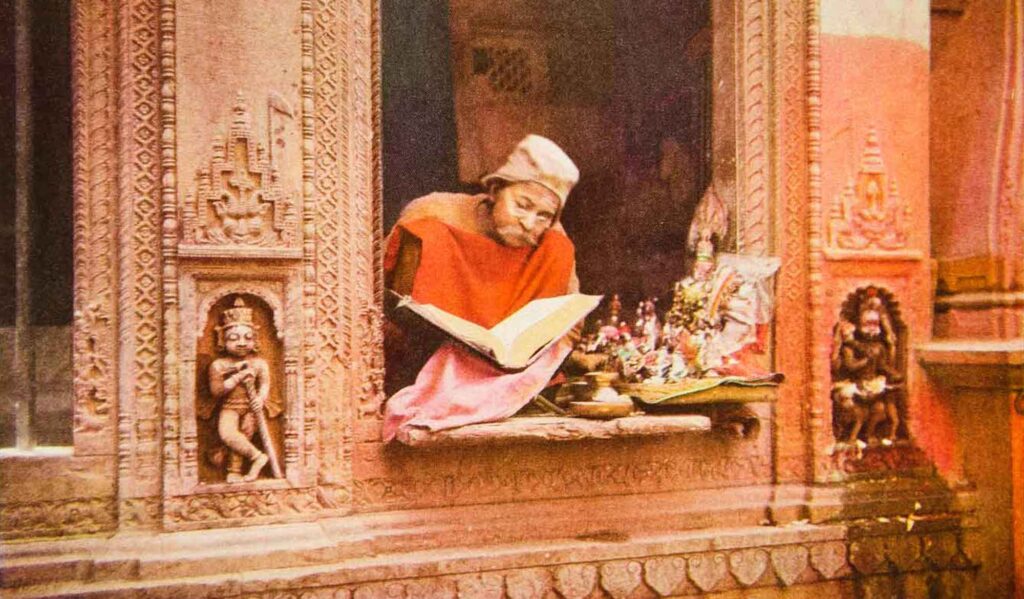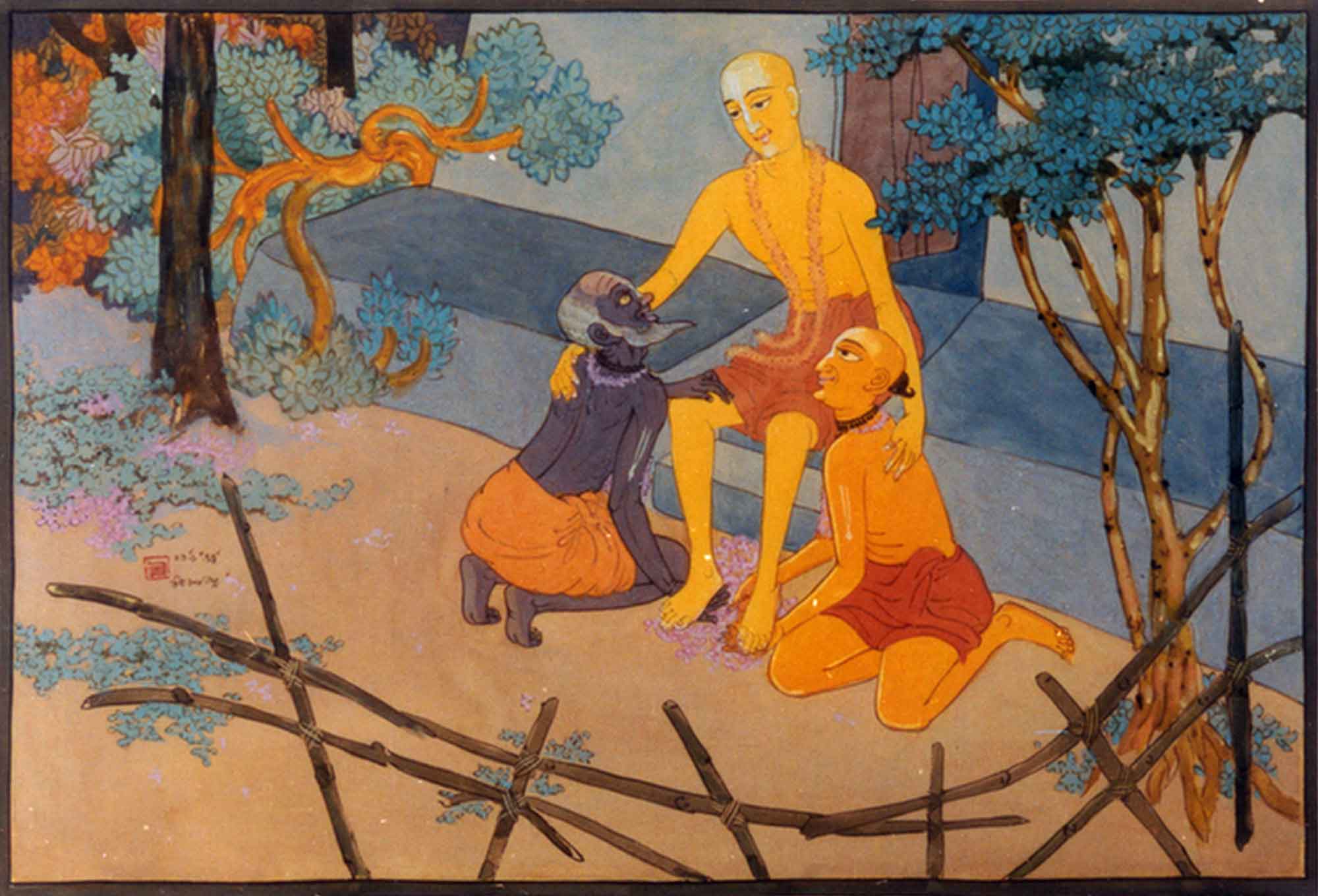Overview
This article "Prajalpa (Idle speech)" is the third in a series of articles published in the 10th Volume of Sajjana Toṣaṇī which deals with the six things that are favourable to bhakti and the six things that are unfavourable according to the second and third verses of Śrīla Rūpa Gosvāmī’s Upadeśāmṛta. This third article deals with Prajalpa - Idle speech and the different types of jalpana (talks) - what sort of talk is favorable for bhakti, and what is unfavourable.
(translated by Bhumipati Dasa)
Listen to this article:
Talking with one another is called jalpana or prajalpa. Nowadays in this world godlessness is so prominent that conversing with others means godless talk. Therefore, it is not profitable for a practicing devotee to engage in jalpana. There can, however, be many kinds of jalpana in the cultivation of devotional service. They are all auspicious for the devotees. Śrīla Rūpa Gosvāmī has written in his Kārpaṇya-pañjikā-stotra:
tathāpy asmin kadācid
vāmadhīśau nāma-jalpini
avadya-vṛnda-nistāri
nāmābhāsau prasīdatam
Devotees recite the purport of this verse in the following words:
tathāpi e dīna-jane
yadi nāma-uccāraṇe
nāmābhāsa karila jīvane
sarva-doṣa-nivāraṇa
duhuṅ-nāma-sañjalpana
prasāde prasīda dui jane
“While chanting the holy name of the Lord, if a wretched person in his lifetime achieves nāmābhasa, or a glimpse of offenseless chanting, then all his faults are destroyed and Their Lordships become pleased with him.”
Kīrtana, offering prayers, and reciting the scriptures are all jalpana; but when these are performed with a favourable mood and devoid of material desire, then they are all cultivation of Kṛṣṇa consciousness. Therefore, the conclusion is this: All prajalpas that are unfavourable to Kṛṣṇa’s service are adverse to devotional service. The practitioner should carefully give up prajalpa. There is no fault in the activities of the mahājanas. The mahājanas have respectfully engaged in prajalpa (favourable to devotional service), and this is our only duty. Sometimes puffed-up devotees advise that all types of prajalpa should be given up. But we are followers of Śrīla Rūpa Gosvāmī; being followers of Rūpa Gosvāmī we will always stick to the path shown by the sadhus who are following his instructions. In the Bhakti-rasāmṛta-sindhu, as quoted from the Skanda Purāṇa, it is said:
sa mṛgyaḥ śreyasāṁ hetuḥ
panthāḥ santāpa-varjitaḥ
anavāpta-śramaṁ pūrve
yena santaḥ pratisthire
“One should strictly follow the easy path that the previous mahājanas have accepted. That path bestows great auspiciousness and is devoid of all misery.”
Our mahājana’s path is that which was shown by Śrīla Vyāsadeva, Śukadeva Gosvāmī, Prahlāda Mahārāja, Śrī Caitanya Mahāprabhu, and His associates. We are not to leave aside that path to follow the instructions of new puffed-up devotees. All the mahājanas have respected that prajalpa which nourishes devotion to Hari. We will discuss this in the appropriate place.
Godless prajalpas are impediments to devotional service. They are of many types. Useless talks, arguments, gossip, debates, fault-finding in others, speaking falsehoods, blaspheming devotees, and worldly talk are all called prajalpa.
Useless talk is extremely detrimental. Practicing devotees should discuss topics of Lord Hari in the association of other devotees and remember Hari’s name, form, qualities, and pastimes in a secluded place without uselessly wasting time. In the Bhagavad-gītā (10.8-9) it is said:
ahaṁ sarvasya prabhavo
mattaḥ sarvaṁ pravartate
iti matvā bhajante māṁ
budhā bhāva-samanvitāḥ
mac-cittā mad-gata-prāṇā
bodhayantaḥ parasparam
kathayantaś ca māṁ nityaṁ
tuṣyanti ca ramanti ca
“I am the source of all spiritual and material worlds. Everything emanates from Me. The wise who perfectly know this engage in My devotional service and worship Me with all their hearts. The thoughts of My pure devotees dwell in Me, their lives are fully devoted to My service, and they derive great satisfaction and bliss from always enlightening one another and conversing about Me.”
Also in the Gītā (9.14) it says:
satataṁ kīrtayanto māṁ
yatantaś ca dṛḍha-vratāḥ
namasyantaś ca māṁ bhaktyā
nitya-yuktā upāsate
“Always chanting My glories, endeavouring with great determination, bowing down before Me, these great souls perpetually worship Me with devotion.”
In this way the practicing devotee should cultivate unalloyed devotion. If they spend their days and nights uselessly talking with materialists, then the Lord’s instruction, “always chanting My glories,” will not be followed. In newspapers there is so much useless talk. For the practicing devotee to read newspapers is a great loss. But if there are topics about pure devotees described in the newspaper, then that can be read. After finishing their meal, mundane people normally smoke and engage in useless talk with other godless people. It is certainly difficult for them to become followers of Śrīla Rūpa Gosvāmī. Reading novels is the same. But if one gets a novel with a story like that of Purañjana in the Śrīmad Bhāgavatam, then reading that is not an impediment, rather it is beneficial.
Argument is a prajalpa that is adverse to devotional service. All the arguments of the followers of nyāyā and vaiśeṣika are simply godless quarrels. They do not yield any result other than wasting the mind’s strength and increasing one’s restlessness. In the Vedas (Kaṭha Upaniṣad 1.2.9) it is said: naiṣā tarkeṇa matir apaneyā “This intelligence cannot be attained by argument.” The living entity’s proper discretion is eternally established in his natural intelligence. That discretion naturally flows towards the lotus feet of the Supreme Lord. But by arguing about directions, places, mistakes, and illusions, the heart becomes tough. Then natural discretion no longer remains. By accepting the Vedic Daśa-mūla instructions and arguing accordingly, one’s mind does not become wicked. What is good, what is bad-when such deliberations are based on the Vedas, that is no longer prajalpa. That is why in the Caitanya-caritāmṛta (Madhya 25.153) Śrī Caitanya Mahāprabhu has given the instruction:
ataeva bhāgavata karaha vicāra
“Study Śrīmad Bhāgavatam very scrutinizingly.”
Discussions to establish the knowledge of one’s relationship with the Lord are not prajalpa. Those who conquer the assembly by useless arguments do not reach any conclusion; therefore, it is certainly one’s duty to give up such logician’s association. This is confirmed in the Caitanya-caritāmṛta (Madhya 12.183) by Śrī Vāsudeva Sārvabhauma, who said:
tārkika-śṛgāla-saṅge bheu-bheu kari
sei mukhe ebe sadā kahi ‘kṛṣṇa’ ‘hari’
“In the association of the jackals known as logicians, I simply continued to bark a resounding ‘bheu bheu.’ Now, from the same mouth I am chanting the holy names ‘Kṛṣṇa’ and ‘Hari.'”
Those who are accustomed to discuss spiritual matters should remember the words of the Vārāṇasī sannyāsī as found in the Caitanya-caritāmṛta (Madhya 25.43):
paramārtha-vicāra gela, kari mātra ‘vāda
‘
kāhāṅ mukti pāba, kāhāṅ kṛṣṇera prasāda
“The atheists, headed by the māyāvādī philosophers, do not care for liberation or Kṛṣṇa’s mercy. They simply continue to put forward false arguments and counter-theories to atheistic philosophy, not considering or engaging in spiritual matters.”
Useless arguments arise from envy or pride, aversion or attachment to sense gratification, or foolishness or self-pride. Quarrelsome people also become intoxicated by useless arguments. While discussing topics of the Lord and His devotees the practicing devotee should always be careful to avoid useless arguments.
Talking without reason about other people is extremely adverse to devotional service. Many people talk about others to establish their own reputation. Being envious, some people are accustomed to discuss others’ character. The minds of those who are busy in such topics can never be fixed on the lotus feet of Kṛṣṇa. Talking about others should be rejected in all respects. But in the practice of devotional service there are many favourable topics that are faultless, even though they are about others. In order to completely renounce talking about others, one needs to live in the forest. The two different types of practicing devotees are the householders and the renunciates. Because the renunciates have no business whatsoever with sense enjoyment, they can give up talking about others in all respects. But because a householder is engaged in earning, saving, protecting, and maintaining the family, he cannot completely give up talking about others. It is best for him to live in a Kṛṣṇa conscious family. When all ones material activities are related with Kṛṣṇa, then even his unavoidable talk about others becomes sinless and a part of devotional practice in relation to Kṛṣṇa. He should not talk about others in a way that is detrimental to anyone. He should talk about others only whatever little is necessary in his Kṛṣṇa conscious family. He should not talk about others without reason. Moreover, when a guru enlightens his disciple on some topic, then unless he occasionally talks about others, his instruction may not be clear. When previous mahājanas have talked about others in this way, there is merit in such talk, not fault. As Śukadeva Gosvāmī said in Śrīmad Bhāgavatam (2.1.3-4):
nidrayā hriyate naktaṁ
vyavāyena ca vā vayaḥ
divā cārthehayā rājan
kuṭumba-bharaṇena vā
dehāpatya-kalatrādiṣv
ātma-sainyeṣv asatsv api
teṣāṁ pramatto nidhanaṁ
paśyann api na paśyati
“The lifetime of such an envious householder is passed at night either in sleeping or in sex indulgence, and in the daytime either in making money or maintaining family members. Persons devoid of ātma-tattva do not inquire into the problems of life, being too attached to the fallible soldiers like the body, children and wife. Although sufficiently experienced, they still do not see their inevitable destruction.”
Although Śukadeva Gosvāmī talks about the materialists in order to instruct his disciple, he is not considered a prajalpī. Therefore, such activities should be considered beneficial. Again, in order to instruct His own disciples, Śrī Caitanya Mahāprabhu spoke about pseudo-renunciates in the following words from the Caitanya-caritāmṛta (Antya 2.117, 120, 124):
prabhu kahe,—”vairāgī kare prakṛti sambhāṣaṇa
dekhite nā pāroṅ āmi tāhāra vadana
kṣudra-jīva saba markaṭa-vairāgya kariyā
indriya carāṣā bule ‘prakṛti’ sambhāṣiyā”
prabhu kahe,—”mora vaśa nahe mora mana
prakṛti-sambhāṣī vairāgī nā kare darśana
“The Lord replied, “I cannot tolerate seeing the face of a person who has accepted the renounced order of life but who still talks intimately with a woman. There are many persons with little in their possession who accept the renounced order of life like monkeys. They go here and there engaging in sense gratification and speaking intimately with women. Śrī Caitanya Mahāprabhu said, “My mind is not under My control. It does not like to see anyone in the renounced order who talks intimately with women.”
Unless one speaks in this way while instructing and while concluding a subject, there is no benefit for oneself or others. Therefore, when the previous ācāryas have personally set example and taught others, how will we be benefitted by acting contrary to their instruction? And if one discusses in this way the improper behaviour current in a religious sect or amongst the general public, then such talk is not averse to devotional service. Even if one sometimes talks about a particular person, there is no fault. In the Śrīmad Bhāgavatam (4.14.29) Maitreya Muni, the foremost devotee, spoke about Veṇa Mahārāja in this way:
maitreya uvāca
itthaṁ viparyaya-matiḥ
pāpīyān utpathaṁ gataḥ
anunīyamānas tad-yācṣāṁ
na cakre bhraṣṭa-maṅgalaḥ
“The great sage Maitreya continued: Thus the King, who became unintelligent due to his sinful life and deviation from the right path, became actually bereft of all good fortune. He could not accept the requests of the great sages, which the sages put before him with great respect, and therefore he was condemned.”
Śrī Maitreya Ṛṣi needed to speak about others in this way; he spoke to his audience to instruct them. This is not prajalpa. The practicing devotee normally discusses ancient history in the association of devotees. Occasionally they talk about non-devotees. Such talk is always auspicious and favourable to devotional service. But those who talk about others while influenced by devotional impediments like envy, hatred, pride, or distinction are offenders at the feet of Bhakti-devī.
Debate arises only from a desire for conquest. It is extremely abominable. Fault-finding arises only from imposing one’s own bad habits on others. This should be given up in all respects. Speaking falsehoods is another form of useless talk. Worldly talk is completely rejected by renounced devotees. Householders may accept some worldly talk that is favourable to devotional service. If topics like archaeology, zoology, astrology, and geography are devoid of God consciousness, they should be rejected. In the Śrīmad Bhāgavatam (12.12.49-50) Śrī Śukadeva Gosvāmī has said:
mṛṣā giras tā hy asatīr asat-kathā
na kathyate yad bhagavān adhokṣajaḥ
tad eva satyaṁ tad u haiva maṅgalaṁ
tad eva puṇyaṁ bhagavad-guṇodayam
tad eva ramyaṁ ruciraṁ navaṁ navaṁ
tad eva śaśvan manaso mahotsavam
tad eva śokārṇava-śoṣaṇaṁ nṛṇāṁ
yad uttamaḥ śloka-yaśo ‘nugīyate
“Words that do not describe the transcendental Personality of Godhead but instead deal with temporary matters are simply false and useless. Only those words that manifest the transcendental qualities of the Supreme Lord are actually truthful, auspicious and pious. Those words describing the glories of the all-famous Personality of Godhead are attractive, relishable and ever fresh. Indeed, such words are a perpetual festival for the mind, and they dry up the ocean of misery.”
Speech in the form of blaspheming sādhus is the source of great inauspiciousness. If one wants to attain devotion to Lord Hari, then he should make a vow like this: “In this life I will never blaspheme sādhus.” Devotees are sādhus. By blaspheming them, all one’s virtues are destroyed. By blaspheming the supremely pure Lord Mahādeva, Prajāpati Dakṣa, the best of ascetics, met with severe inauspiciousness. As stated in Śrīmad-Bhāgavatam (10.4.46):
āyuḥ śriyaṁ yaśo dharmaṁ
lokān āśiṣa eva ca
hanti śreyāṁsi sarvāṇi
puṁso mahad-atikramaḥ
“My dear King, when a man persecutes great souls, all his benedictions of longevity, beauty, fame, religion, blessings and promotion to higher planets will be destroyed.”
The conclusion of this essay is this: Whatever prajalpa is not favourable for devotional service should be carefully given up by Vaiṣṇavas who are cultivating bhakti. Amongst these instructions, the instruction to tolerate the urge to speak mentioned in the first verse – vāco vegaṁ – is only a conditional urge. By giving up prajalpa, the urge to speak is permanently regulated. In order to pass one’s life without sin, one should not speak anything more than whatever little is necessary. One need discuss only whatever is auspicious for oneself and others. If one wants to discuss topics of others, it will simply be useless speech. Therefore, in the Śrīmad Bhāgavatam (11.28.2) Lord Kṛṣṇa instructed Uddhava as follows:
para-svabhāva-karmāṇi
yaḥ praśaṁsati nindati
sa āśu bhraśyate svārthād
asaty abhiniveśataḥ
“Whoever indulges in praising or criticizing the qualities and behaviour of others will quickly become deviated from his own best interest by his entanglement in illusory dualities.”
(‘Prajalpa – Idle speech’ is the third in a series of articles published in the 10th Volume of Sajjana Toṣaṇī by Bhaktivinoda Ṭhākura. This article was translated by Bhumipati Dasa)
Related Articles and Books:
Further Reading:
- Upadeśāmṛta (The Nectar of Instruction) with the illuminations of Śrīla Śrīdhara Deva Gosvāmī’ (Book)
- Upadeśāmṛta Audiobook
- Dāsa Gosvāmī and the Unique Position of Govardhana by Śrīla Bhakti Gaurava Narasiṅgha Mahārāja
- Śrīla Śrīdhara Mahārāja and the Gem of All Conceptions by Śrīla Bhakti Gaurava Narasiṅgha Mahārāja
- The Appearance of Rādhā-kuṇḍa by Śrīla Bhakti Gaurava Narasiṅgha Mahārāja
- The Greatest Negative by Śrīla Bhakti Gaurava Narasiṅgha Mahārāja
- Preface to the Upadeśāmṛta by Śrīla Bhakti Kiśora Āraṇya Mahārāja













